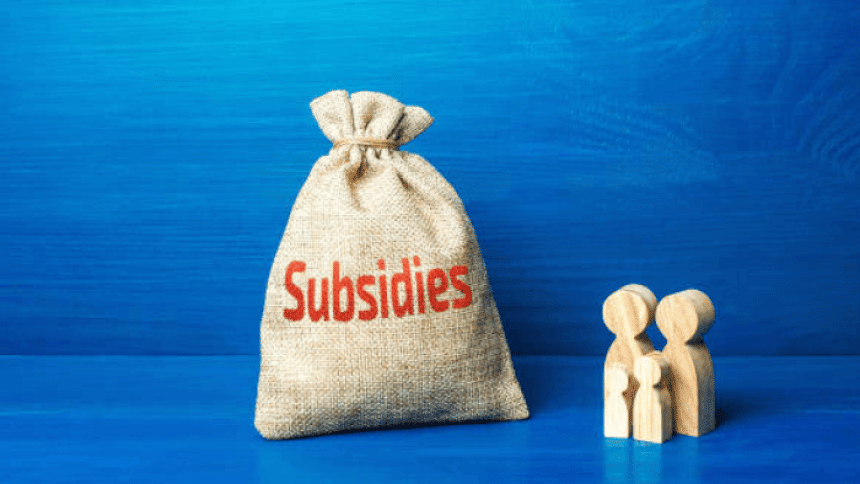Non-apparel subsidies wasteful

Bangladesh's current strategy of providing subsidies on non-readymade garment (non-RMG) exports is economically inefficient and fiscally burdensome, as these industries have failed to demonstrate significant growth despite generous incentives and high tariff protection, said economists yesterday.
"Subsidies are being provided without time limits, and if they were effective, we'd see significant growth in non-garment exports," said Zaidi Sattar, chairman of the Policy Research Institute of Bangladesh (PRI).
He was presenting Monthly Macroeconomic Insights (MMI) at the organisation's office in Dhaka.
The MMI, a new analytical initiative by the PRI's Center for Macroeconomic Analysis, has been developed with support from the Department of Foreign Affairs and Trade of the Australian government.
According to the MMI analysis, the total value of Bangladesh's merchandise exports stood at $48.36 billion in the last fiscal year (FY) of 2024-25, marking an 8.6 percent year-on-year growth.
"Subsidies are being provided without time limits, and if they were effective, we'd see significant growth in non-garment exports," said Zaidi Sattar, chairman of PRI
Of this, RMG exports rose by 8.8 percent to $39.34 billion, while non-RMG exports increased by 7.4 percent to reach only $8.94 billion.
Bangladesh currently offers up to 15 percent cash subsidy on exports.
But Sattar noted that non-RMG sectors already enjoy much higher indirect subsidies given to import-substitution sectors, which effectively shield them from foreign competition, undermining the need for export incentives in the first place.
Worse still, he pointed out, nearly half of the cash subsidies are being directed toward exports and remittances, sectors already benefiting from a 40 percent exchange rate gain since the local currency began depreciating in May 2022.
The economist stated that Bangladesh's total subsidy allocation for fiscal year 2024-25 has ballooned to Tk 322.3 billion, a 43.8 percent rise from the previous year.
Agriculture received the highest allocation of Tk 170 billion.
"This amounts to 2.28 percent of the total expenditure and 0.3 percent of the country's gross domestic product, marking a significant 107 percent year-on-year increase in FY25," he added.
Besides, Tk 78.3 billion was allocated for export incentives to promote growth in export-oriented industries, reflecting a 5.8 percent year-on-year increase in export incentives.
"These subsidies, like protective tariffs, should be time-bound and performance-based," Sattar said, adding that Bangladesh must begin phasing them out in preparation for its LDC graduation.
The economist also said the recent slowdown in the economy has kept import demand low, but with improved foreign exchange reserves, the import controls imposed over the past few years should be lifted.
Going forward, exchange rates should determine import levels, in line with the current policy being pursued by the Bangladesh Bank, he added.
The PRI chief also warned that a large section of the population still hovers just above the poverty line despite a steady decline in poverty over the years, leaving them highly vulnerable to economic shocks.
"A 10 percent drop in income could push an additional 10 percent of people into poverty," he said, adding that the national poverty rate is projected to rise to 22.9 percent in 2025, up from 18.7 percent in 2022.
Furthermore, the proportion of people living in extreme poverty—those earning less than $2.15 a day—is expected to nearly double to 9.3 percent.
During the keynote presentation at the event, Ashikur Rahman, principal economist at the PRI, revealed that in June 2025, the National Board of Revenue (NBR) collected Tk 487.7 billion, a 24 percent increase from the previous month, but a 16.3 percent drop year-on-year.
Bangladesh has failed to reach its revenue collection target for the 13th consecutive year, he stated.
Though reforms are underway at the NBR, Rahman said, "Real reform is inherently disruptive. It challenges entrenched interests, creates winners and losers, and inevitably sparks protests—signs that the status quo is being shaken."
"Crucially, reforms require long-term political commitment and cannot be achieved within a single term," he added.
Rahman also said the present government must now learn from past governments' failures and commit to long-term, institutional reform to secure financial stability and economic resilience.
Muhammad Abdul Mazid, a former NBR chairman, said Bangladesh's limited fiscal space is a major challenge for the incoming government.
He pointed out three red flags: a low tax-to-GDP ratio, weak debt management, and rising public borrowing that crowds out private investment.
"These trends threaten sustainable growth and require urgent political commitment and reform," he said.
Abdul Moyeen Khan, a BNP standing committee member, argued that reforms must be inclusive, not politically framed.
He urged the government to restore public trust through transparency, accountability, and free elections.
"To build a strong economy, we must first build trust in our government," he said, calling democracy the foundation for lasting progress.

 For all latest news, follow The Daily Star's Google News channel.
For all latest news, follow The Daily Star's Google News channel. 



Comments